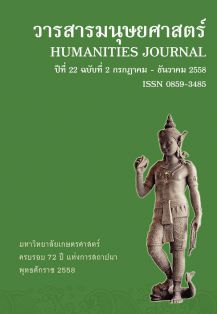Transnational Cinemas in Southeast Asia: A Case Study of Good Morning Luang Prabang (2008), Pleasure Factory (2007) and That Sounds Good (2010)
Main Article Content
Abstract
This study is aimed to examine the core and artistic composition of three films: Sabaidee Luang Prabang (Good Morning Luang Prabang), Rong-Ngan Arom (Pleasure Factory) and Rao Song Sam Khon (That Sounds Good). The concepts of transnational film and the film genre are applied to analyse the film content and social condition at the time when and the place where the films were made and shown.
The findings are as follows: Sabaidee Luang Prabang and Pleasure Factory are the international co-productions that present transnational elements which are culture, beautiful natural settings and history of each country through romantic-comedy film genre. The productions’ casts and crews are mixed nationalities from different countries. The films are full of transnational films elements, that is, the themes of memory and nostalgia. Due to restricted rules in each country, the plots of Sabaidee Luang Prabang and That Sounds Good are simple and do not touch any sensitive issues of Lao People's Democratic Republic and Socialist Republic of Vietnam. However, an exception is Pleasure Factory since the film presents sexual taboo through the art cinema genre. This specific film was produced and allowed to show in Singapore; however scenes of male homosexual intimate relationship were removed.


